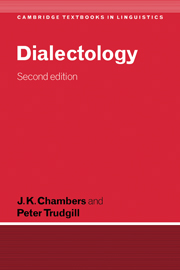1 - Dialect and language
Published online by Cambridge University Press: 05 June 2012
Summary
Dialectology, obviously, is the study of dialect and dialects. But what exactly is a dialect? In common usage, of course, a dialect is a substandard, low-status, often rustic form of language, generally associated with the peasantry, the working class, or other groups lacking in prestige. dialect is also a term which is often applied to forms of language, particularly those spoken in more isolated parts of the world, which have no written form. And dialects are also often regarded as some kind of (often erroneous) deviation from a norm – as aberrations of a correct or standard form of language.
In this book we shall not be adopting any of these points of view. We will, on the contrary, accept the notion that all speakers are speakers of at least one dialect – that standard English, for example, is just as much a dialect as any other form of English – and that it does not make any kind of sense to suppose that any one dialect is in any way linguistically superior to any other.
Mutual intelligibility
It is very often useful to regard dialects as dialects of a language. dialects, that is, can be regarded as subdivisions of a particular language. In this way we may talk of the Parisian dialect of French, the Lancashire dialect of English, the Bavarian dialect of German, and so on.
- Type
- Chapter
- Information
- Dialectology , pp. 3 - 12Publisher: Cambridge University PressPrint publication year: 1998



